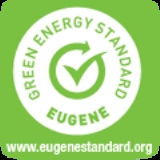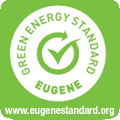
Eugene Green Energy Standard
Encyclopedia

The Eugene Green Energy Standard was an international standard
International standard
International standards are standards developed by international standards organizations. International standards are available for consideration and use, worldwide...
to which national or international green electricity label
Label
A label is a piece of paper, polymer, cloth, metal, or other material affixed to a container or article, on which is printed a legend, information concerning the product, addresses, etc. A label may also be printed directly on the container or article....
ling schemes could be accredited
Product certification
Product certification or product qualification is the process of verifying that a certain product has passed performance tests and quality assurance tests or qualification requirements stipulated in contracts, regulations, or specifications...
to confirm that they provide genuine environmental benefits. It was designed to encourage the generation and use of additional renewable energy
Renewable energy
Renewable energy is energy which comes from natural resources such as sunlight, wind, rain, tides, and geothermal heat, which are renewable . About 16% of global final energy consumption comes from renewables, with 10% coming from traditional biomass, which is mainly used for heating, and 3.4% from...
sources for electricity generation
Electricity generation
Electricity generation is the process of generating electric energy from other forms of energy.The fundamental principles of electricity generation were discovered during the 1820s and early 1830s by the British scientist Michael Faraday...
, although the limited use of additional natural gas
Natural gas
Natural gas is a naturally occurring gas mixture consisting primarily of methane, typically with 0–20% higher hydrocarbons . It is found associated with other hydrocarbon fuel, in coal beds, as methane clathrates, and is an important fuel source and a major feedstock for fertilizers.Most natural...
-fired cogeneration
Cogeneration
Cogeneration is the use of a heat engine or a power station to simultaneously generate both electricity and useful heat....
plant was also supported. Initially funded in part through the EU's clean-e programme, but also including some participants from outside Europe, the Eugene standard was formally discontinued after February 2009.
Dismantling
On 2 February 2009, EUGENE’s General Assembly voted in favour of its dismantling. It was agreed that the members and board would continue to work together to promote green energy in Europe, but that the EUGENE standard and the association (ASBL) under Belgian law would cease to exist.The standard
The standard confirmed that energy supplied under the accredited schemes:- Is produced from genuinely sustainable energy sources.
- Will result in a real increase in renewable generation beyond the requirements imposed by government ('additionality').
- That the demand from consumers is matched by renewable generation.
Two variations of the standard, 'gold' and 'silver', differentiated between schemes depending on the additionality of new renewable energy supplied. The development of the standard was aided by the European Union
European Union
The European Union is an economic and political union of 27 independent member states which are located primarily in Europe. The EU traces its origins from the European Coal and Steel Community and the European Economic Community , formed by six countries in 1958...
's CLEAN-E initiative during 2005 and 2006
Accredited energy labels
National energy labels formerly accredited by EUGENE included:The organisation also recommends certain other national schemes that are progressing towards accreditation, including:
 Finland: EKOenergyEKOenergyEKOenergy label is an international ecolabel for energy. It is managed by the Finnish Association for Nature Conservation in cooperation with the Swedish Society for Nature Conservation...
Finland: EKOenergyEKOenergyEKOenergy label is an international ecolabel for energy. It is managed by the Finnish Association for Nature Conservation in cooperation with the Swedish Society for Nature Conservation...
in Wikipedia and official EKOenergy website in English Netherlands: Milieukeur
Netherlands: Milieukeur  Sweden: Bra Miljöval
Sweden: Bra Miljöval
There was no Eugene accredited scheme in the United Kingdom
United Kingdom
The United Kingdom of Great Britain and Northern IrelandIn the United Kingdom and Dependencies, other languages have been officially recognised as legitimate autochthonous languages under the European Charter for Regional or Minority Languages...
. The UK's energy regulator (Ofgem) published guidelines in February 2009 that broadly followed the EUGENE standard, requiring matching and additionality through carbon savings, although allowing the latter to be met through energy efficiency or offsetting, as well as through new renewables schemes. These were implemented in February 2010 in the UK's Green Energy Supply Certification Scheme.
The Eugene Standard had also been adopted in Chile
Chile
Chile ,officially the Republic of Chile , is a country in South America occupying a long, narrow coastal strip between the Andes mountains to the east and the Pacific Ocean to the west. It borders Peru to the north, Bolivia to the northeast, Argentina to the east, and the Drake Passage in the far...
, while a pilot scheme is in progress in France
France
The French Republic , The French Republic , The French Republic , (commonly known as France , is a unitary semi-presidential republic in Western Europe with several overseas territories and islands located on other continents and in the Indian, Pacific, and Atlantic oceans. Metropolitan France...
.
The Eugene Network
The standard was managed by the Eugene Network (formerly the European Green Electricity Network), an international membership-based non-profit organizationNon-profit organization
Nonprofit organization is neither a legal nor technical definition but generally refers to an organization that uses surplus revenues to achieve its goals, rather than distributing them as profit or dividends...
. The Network aimed to coordinate and harmonise green energy labelling nationally and internationally, promote the adoption of the Eugene Standard as the basis for national and international green energy market
Energy market
Energy markets are those commodities markets that deal specifically with the trade and supply of energy. Energy market may refer to an electricity market, but can also refer to other sources of energy...
s, and encourage consumers and suppliers to choose credible green energy products. Formal discussions on the Eugene standard first took place in 2000, led by the World Wide Fund for Nature
World Wide Fund for Nature
The World Wide Fund for Nature is an international non-governmental organization working on issues regarding the conservation, research and restoration of the environment, formerly named the World Wildlife Fund, which remains its official name in Canada and the United States...
, and it was officially launched on June 24, 2002. The Eugene Network was legally established in 2003 and the first national energy labels were accredited in 2004.
Full voting membership of the Network was open to 'citizen organisations pursuing not for profit activities with the objectives of promoting green electricity but with no direct interests in the generation and supply of energy services'. Organisations outside this scope but which do 'have a commitment and interest in creating a viable green energy market' were able to become non-voting associate members or supporters.
As of June 2007, the members of the Eugene Network were:
- World Wide Fund for NatureWorld Wide Fund for NatureThe World Wide Fund for Nature is an international non-governmental organization working on issues regarding the conservation, research and restoration of the environment, formerly named the World Wildlife Fund, which remains its official name in Canada and the United States...
http://www.panda.org/about_wwf/what_we_do/climate_change/solutions/business_industry/green_energy_eugene/eugene/index.cfm  Chile: Instituto de Ecología Política http://www.iepe.org
Chile: Instituto de Ecología Política http://www.iepe.org Finland: Finnish Association for Nature Conservation http://www.ekoenergia.info/
Finland: Finnish Association for Nature Conservation http://www.ekoenergia.info/ Early Modern France: Comité de Liaison Energies Renouvelables http://www.cler.org/info/rubrique.php3?id_rubrique=92
Early Modern France: Comité de Liaison Energies Renouvelables http://www.cler.org/info/rubrique.php3?id_rubrique=92 Germany: EnergieVision http://www.energie-vision.de/
Germany: EnergieVision http://www.energie-vision.de/ Spain: Asociacion para la Defensa de la Naturaleza http://www.wwf.es/
Spain: Asociacion para la Defensa de la Naturaleza http://www.wwf.es/ Sweden: Swedish Society for Nature Conservation http://www.snf.se
Sweden: Swedish Society for Nature Conservation http://www.snf.se Switzerland: Association for Environmental Friendly Electricity (VUE) http://www.naturemade.ch/
Switzerland: Association for Environmental Friendly Electricity (VUE) http://www.naturemade.ch/ Switzerland: Swiss Federal Institute for Environmental Science and Technology (EAWAG) http://www.eawag.ch
Switzerland: Swiss Federal Institute for Environmental Science and Technology (EAWAG) http://www.eawag.ch
See also
- Electricity retailingElectricity retailingElectricity retailing is the final process in the delivery of electricity from generation to the consumer. The other main processes are transmission and distribution.- Beginnings :...
- Energy conservationEnergy conservationEnergy conservation refers to efforts made to reduce energy consumption. Energy conservation can be achieved through increased efficient energy use, in conjunction with decreased energy consumption and/or reduced consumption from conventional energy sources...
- Energy policyEnergy policyEnergy policy is the manner in which a given entity has decided to address issues of energy development including energy production, distribution and consumption...
- Energy qualityEnergy qualityEnergy quality is the contrast between different forms of energy, the different trophic levels in ecological systems and the propensity of energy to convert from one form to another. The concept refers to the empirical experience of the characteristics, or qualia, of different energy forms as they...
- Environmental concerns with electricity generationEnvironmental concerns with electricity generationThe environmental impact of electricity generation is significant because modern society uses large amounts of electrical power. This power is normally generated at power plants that convert some other kind of energy into electrical power...
- Global warmingGlobal warmingGlobal warming refers to the rising average temperature of Earth's atmosphere and oceans and its projected continuation. In the last 100 years, Earth's average surface temperature increased by about with about two thirds of the increase occurring over just the last three decades...
- ISO 14001
- Low-carbon economyLow-carbon economyA Low-Carbon Economy or Low-Fossil-Fuel Economy is an economy that has a minimal output of greenhouse gas emissions into the environment biosphere, but specifically refers to the greenhouse gas carbon dioxide...
- REN21REN21REN21, the Renewable Energy Policy Network for the 21st Century, is a policy network that provides a forum for international leadership in renewable energy policy, in order to share knowledge and facilitate the rapid growth of renewable energy technologies in developing countries and industrialised...
External links
- GreenLabelsPurchase.net: Eugene
- Present and Future Development of Bra Miljöval-labelled electricity (2005-02-14)
- Additionality in renewable energy
- Association for Environment Conscious Building: The Green Electricity Illusion
- Eugene Standard entry at ecolabelling.org
In the media
- January 1, 2007, Leonardo Energy: Green Power labels not yet at full power
- October 2, 2002, World Wildlife Fund: Green electricity that really is green

